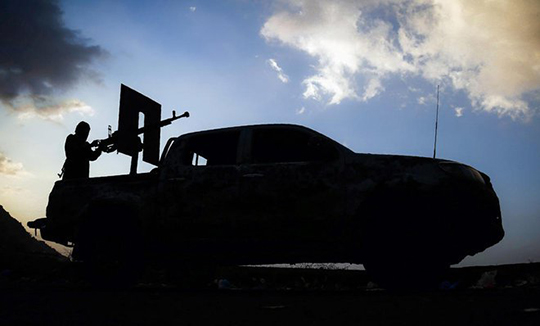Aden, Nov 17: Heavy fighting between government forces and rebels in north and west Yemen has left 51 dead, as a new peace efforts appeared to stumble, military officials said Wednesday.

They said forces loyal to President Abedrabbo Mansour Hadi have clashed since Tuesday with Shiite Houthi rebels and allied renegade troops in the country’s northwest, near the border with Saudi Arabia.
The fighting as loyalists launched an attack on three fronts to recapture the coastal town of Midi and nearby Haradh, the officials said.
Fifteen loyalists and 23 rebels were killed in the fighting, the officials said.
“Our military operations will continue until we push them out,” said army Col. Abdul Ghani Al-Shubaili, whose forces had air support from a Saudi-led Arab coalition.
Elsewhere, nine rebels and four soldiers were killed in fighting on the outskirts of the flashpoint city of Taiz, in southwest Yemen, military officials said.
Pro-Hadi forces have advanced toward the city’s presidential residence and police headquarters, both under rebel control, witnesses said, reporting heavy fighting and loud explosions that shook the city.
Fighting in Taiz and its surroundings on Tuesday killed 39 people, including five civilians, 20 soldiers and 14 rebels, military officials said.
The UN says more than 7,000 people have been killed and nearly 37,000 wounded in Yemen since the Arab coalition launched a military campaign in March 2015 in support of the government against the Iran-backed rebels.
Millions are in need of food aid, and another 21 million people urgently need health services, according to the United Nations.
US Secretary of State John Kerry said on Tuesday that rebels were ready to observe a cease-fire plan taking effect this week, but the government swiftly dismissed the proposal, saying it was like rewarding the Houthis for their violent rampage.
Kerry spoke a day after meeting Houthi negotiators in Oman, but Hadi’s government said it was not aware of any new peace initiative.
Six attempts to clinch a cease-fire in Yemen have foundered, including a three-day October truce that fell apart as soon as it went into force. It was designed to allow aid deliveries to millions of homeless and hungry Yemenis.





Comments
Add new comment